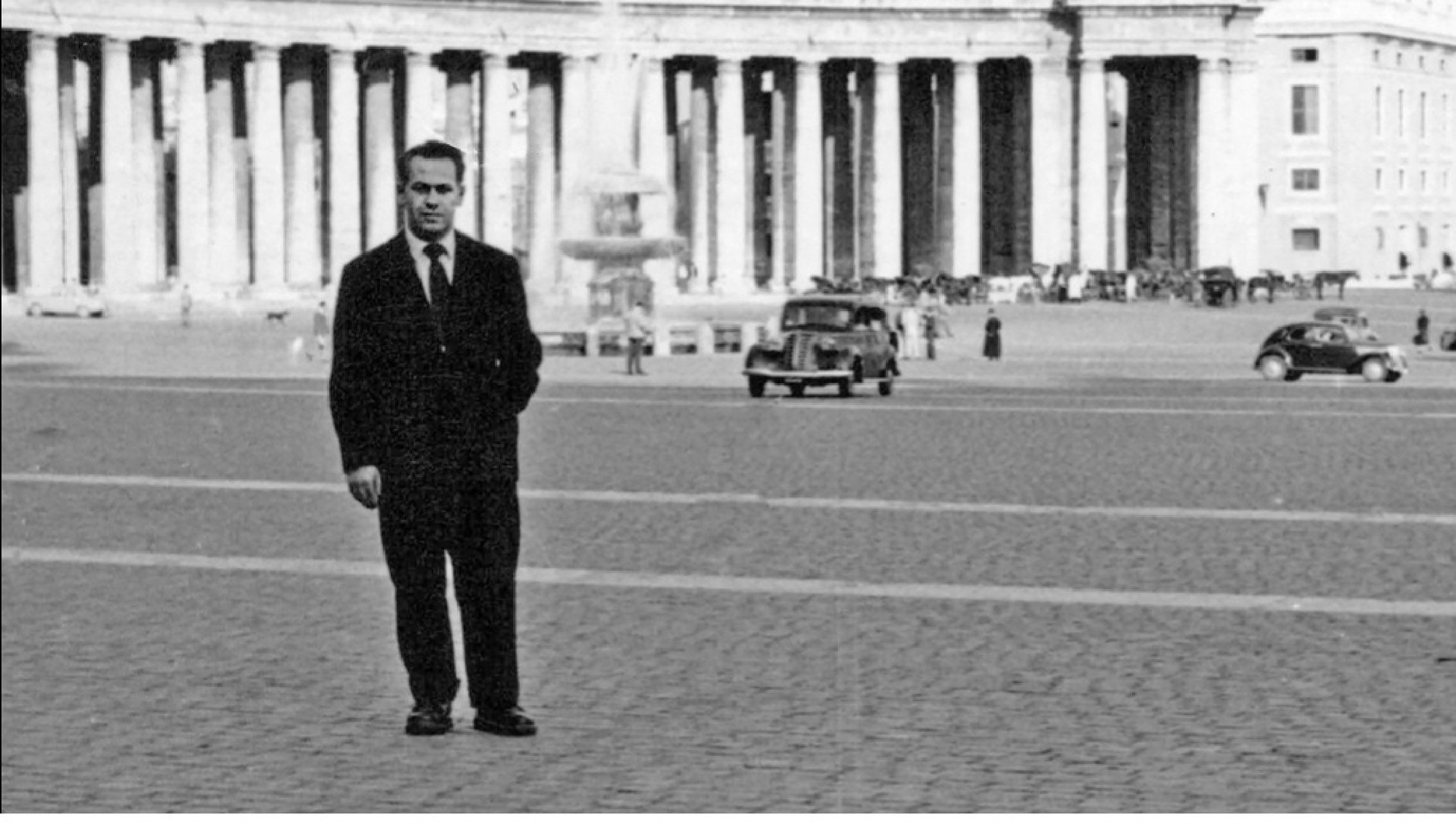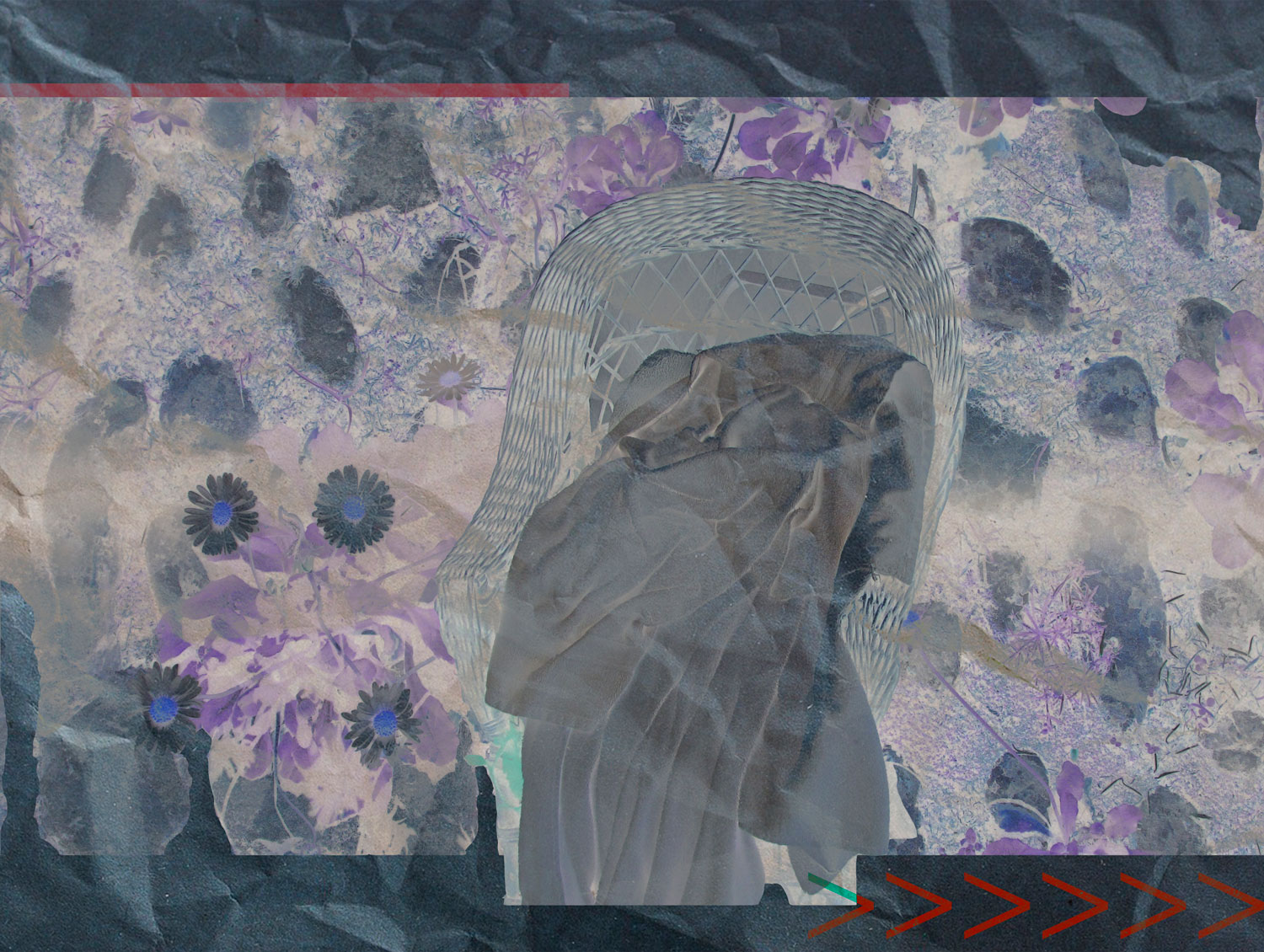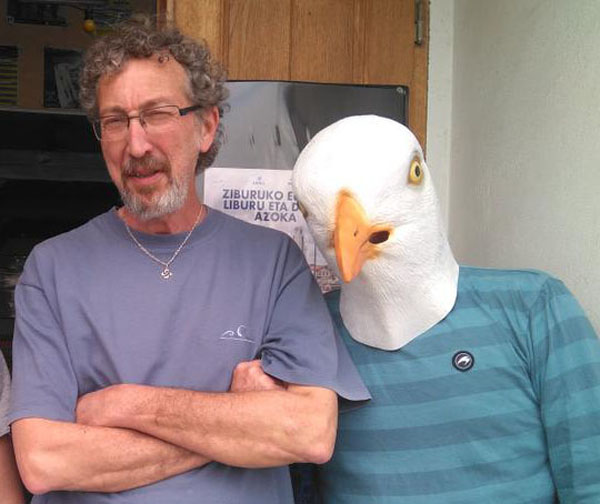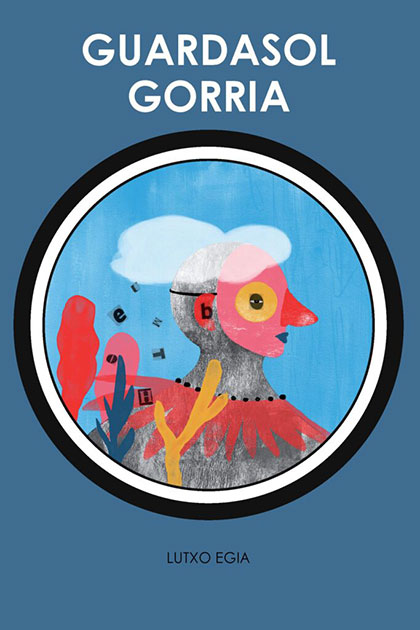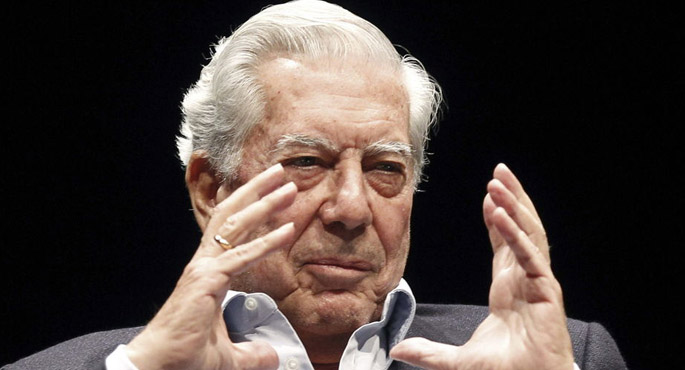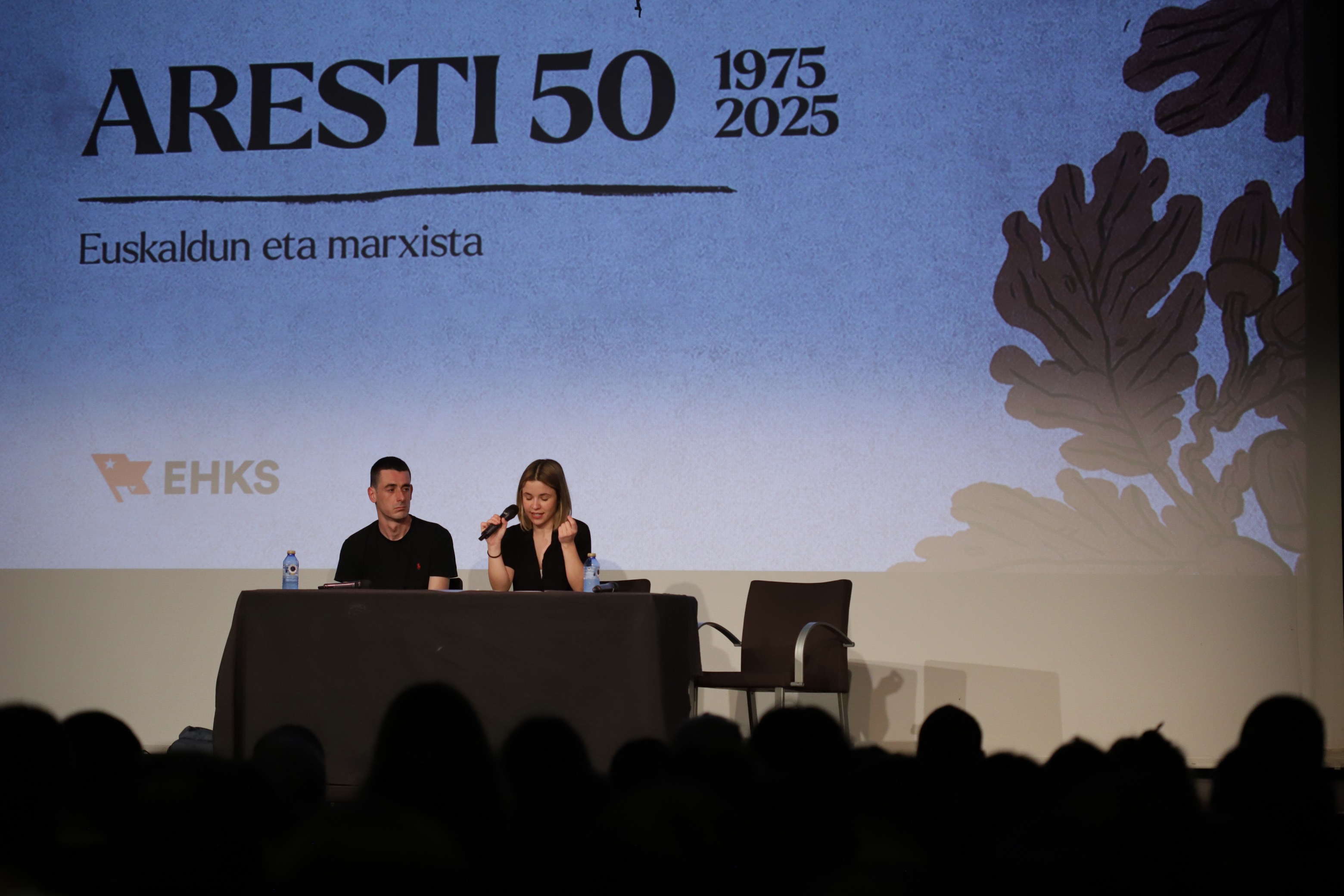"In Basque, the lack of gender gives strength to the preponderance of men"
- Marie Darrieussecq (1969, Baiona) is one of the most prolific writers in France. Psychoanalyst, implicated in different political and social causes, the trajectory of the Labortan writer kicked off with the novel « Truismes » (1996 - POL). Mother of two children, although living in Paris, often returns to her home in Lapurdi. In this interview, offered in the mediatheque of Biarritz, he tells us about his relationship with the native land, the mother language and the anecdotes lived as Basques of Paris.

In summer, you spend a long holiday period in Euskal Herria, to rest, to regain strength, to work...
All three at a time. I need to physically feel the sea wind, to see the sea. I still have young children and we spend the holidays much better here than in the city. I also write well here in the morning. I have fewer orders than in Paris. I need to be here frequently and when I grow up children, I also have to spend much of the year here.
Tell us the pieces of life here.
When I was young, I was going to the nightclubs in Biarritz. He also made parties in Baiona, with many friends coming on vacation; then he created children and went out less. It's very common.
I live in a small town in the interior. I like being surrounded by trees, being in front of the garden in the morning, writing. I go to the beach or, rather, I'm going to bathe, swim in the waves. I stayed there for a while, without stepping the sand too hard and we entered the house. It's a very quiet life. We have a lot of grace for that. I fully realize the peace here. A paradoxical peace. Because this people has not always been peaceful.
It's a very interesting world for a woman who writes, writes in the good conditions that I have. Everything moves a lot, it's a time of novel, dangerous and novelty.
I move a lot. I make a lot of bicycles. I like the corners of Errobi. I love Biarritz off-season. I rarely leave in summer. I'm not going to denounce where I'm going, but it's not to start the beach in the city center. I have some friends here, but I don't go that far. I love this mediateque in Biarritz. In fact, my father lived here a few years ago and we saw this building rise out of the window of his house. It's changed home since then, but I always like the site.
Do you often cross the Bidasoa Bridge?
Yes, I had a very good friend, Hasier Etxeberria. Maleruski died last year. It hurts me a lot to lose Hasier. I was going to see her often to Hendaia and to the town of Gaztelu. Since I separated from us, it is true that I crossed less, I go less to the other side, as it is said here, although for me the perseverance of this people is absolute. But the truth is that the border crossing was directly related to the Beginning. For those who do not know it, Hasier Etxeberria was a letrist, a fine chef, a good ambassador of Basque culture, writer and television man, « Sautrela », presenter of the literary program of Euskal Telebista, in which we met about eighteen years ago.
Does he continue to blow the Parisian people when he speaks of Basque origin?
Yes, I think that doesn't change that much. About twenty years ago, when I was claiming my Basque origin, I was angry with the Parisian Jacobins, especially my editors; I love them a lot, but they mocked me a little. It is very difficult to understand that this is a wealth, not an attack. My colleague Hasier told me in Hendaia that when you go to a bakery and ask for a bread in Basque, you are considered terrorists. So in Paris, it's absolutely impossible. Bon, I've written a lot about it, I hope you've contributed to things changing. However, the time we live in has nothing to do with my youth. The issue of identity is not in the same place, and the issue of terrorism has also changed its place. It's actually all changing at great speed. It seems that the Basque issue has been resolved peacefully and at the same time it has been forgotten, paradoxically; it has become a very lively local issue and it seems that in Madrid and Paris they have something else to do. It's a very different time. There is contempt for small peoples, also for guilt. I recall that in the GAL (Groupe Anti-terrorism de Libération), the issue of anti-terrorist militias has not yet been clarified. It's always a very dark subject. From Madrid, cases of torture in police stations in Spain cannot be relaxed. There are no credible words. Subsequently, there was a great deal of confusion in 2004, when the attacks took place at the stations in Madrid, when Aznar was said to be ETA. I remember that very well. In fact, it was March 11 and my daughter was born on March 8; so I was in the abbey, with my little girl in my bubble, and I heard Aznar on the radio say it was ETA. Inside, I thought, “No, it’s not possible.” For a number of reasons it could not be ETA. In addition, it was a real political suicide for Aznar. At that time, I think there was a breakdown, for a lot of things. First, because terrorism became Islamist, turning other terrorism into “has been”. It is horrifying to see how one violence leaves another outdated. I find it disheartening. It was also a great political confusion, and we have fallen at another time, all of a sudden, very brutally. I don't think all of that has been cured. Then there has been this very nice peace process, although I understand that the very word I have read has been criticised. I really am against violence and I hear the victims. I am in favour of the victims, but I also understand that there is an aspiration for independence in this country. However, nothing justifies violence. Violence mocks the ambition for independence. Paris despises him and Madrid responds to him with brutality. I have suffered it. So Parisian people don't understand the urge. They also confuse it with the Irish, and it is true that these are similarities.
The peace process has been very noble with Kofi Annan, Pierre Jox, with precious votes, but I think they care about a radish in Paris. It's very strange. I write articles on the subject, but maybe (smiling) we are excited by ourselves, the Basques.
Do you think that the French are glotophobes, that is to say they dominate other languages?
When I passed the big Paris contests, especially Normale Sup, in my mouth, I was advised to remove the accent I had more marked than today. And I erased it, it was my interest, but over time it was very strong.
My mother was banned from speaking fully in Basque, it was the other generation. Consequently, my affiliation with my mother became Basque.
If I had a Basque passport, a secular people who assured me of equality between women and men and membership of Europe. I said yes immediately. I would like to have a Basque identity.
I have travelled a lot, especially in French-speaking Africa, although this word disguises me, let us say in the French-speaking Africa, so that it might acquire the beauty of all the French, even the French of Quebec ... The literature of other countries that speak French is, however, very successful; people like Alain Mabanckou, more than that of another Frenchman, are very good messengers of another way of counting anecdotes. It seems to me that this also really seduces us, let us not inflate the issue. The French are not fools. Not all French people. I feel comfortable in that wonder. I very much like the French language, because it is one more one among others. There is the bloodletting; I want to say “for the French – French”, French is a natural state. They think that the whole planet knows French, that it's a real richness to fall out of different languages. French is not a sacred language, it is not a temple, you can play with it, you can change it. The French academy is a nonsense to me, a stupidity. The Frenchman is the most alive. He is traversed in other languages with different ways of speaking French, including English, which is no devil. I read recently that there are more than five thousand words in French, for example, of Arab origin. We have been crossed by different parties and at the same time we have influenced other languages, it is neither good nor bad, it is.
You have shown your solidarity with Oleg Sentsov, a Ukrainian filmmaker imprisoned in Russia... You say you feel guilty about injustices.
Yes, I have a very nice life, especially when I'm here. I write quietly in the morning. No one forbids me from writing. No one censors me. I'm in a suitable town to write, especially as a woman. In most countries of the world, women are forbidden to write. Either they have been exiled or threatened. So yes, there is a feeling of Judeo-Christian guilt. But that guilt is nothing more than a loss of strength. There is no reason for this. And vice versa, we have and must take advantage of this grace. I do everything I can for Oleg Sentsov; the real culprits are the dictators. I'm saying obvious things, but the culprits are El-Assad, Poutine, Trump. We live on a broken planet, between the good and the evil, in the form of a "Star Wars" a bit unfortunately, it is a Manichean, subtle era.
What is freedom of expression in this non-subtle world?
I think people are freer than ever before. The Internet is a great content full of freedom of expression. Anyone can say whatever they want. It's a metaphor. There are some self-censorship points about Islam. It is a very sensitive issue. Indeed, it is very difficult to risk speaking freely. I wrote at Charlie Hebdo for two and a half years. I know what I'm talking about. The lack of genuine freedom of expression is a point of risk when it comes to criticising religions. It is a very sensitive issue. For example, is there Islamophobia or not? I think it's racism and Islamophobia, to silence atheists. I'm an atheist. People say religion is a global evil. I already said it in 1996... Yes, you risk a lot today saying it, it is horrible.
In the book 'Le Pays' you refer to a world without borders, made up of small peoples... Does that point of view interest you or frighten you?
He had just arrived in Ukraine. There I was sensitized by the Ukrainians to the cause of Olfunct Sentsov. Yes, the world would be simpler if there were only two or three states fighting...But no, everything has been divided into small states, as a result of conflicts and sometimes also by peaceful divisions. I remember the Baltic peoples. Independence has been regained in the face of the gigantic Russia, a wonderful country on the other hand, but imperialist.
I guess witches were the ancestors of writers. Because women were denied the right to write. Marguerite Occupied and many others have expressed the same thing before me... I like that heritage.
I've been to China recently, where as part of imperialism and total care, it's the country that scares me the most, and in time it's a magical civilization. I mean, everything is very complex and very stimulating. It's a world that's radically changing. I think it's a very interesting world for a woman who writes, who writes in the good conditions that I have. Everything is moving a lot. It is a new, dangerous and new era.
In this world where it's moving, how do you see that need to go back to the source?
The French Jacobins have confused patriotism with evil. The intellectuals around me, the left-wing intellectuals, to put it soon, see all the branches of the extreme right in nationalism, all their values, their work, their family, their homeland. It is very difficult to understand that nationalism is not a negative value in itself. Sometimes I also have some doubts. If I had a Basque passport, a secular people, that would ensure equality of women and men and membership of Europe, etc... I said yes immediately. I would like to have a Basque identity. With people like Hasier Etxeberria, Arkaitz Cano or Itxaro Borda it would be ridiculous to form a people. But that is very difficult to explain to the French. And it's that they live very comfortable in a village that's thousands of years old, without asking how that village came about. They have not had to fight for a people in the last thousand years. It's too much, you can't understand it. For the Spaniards it is different, it is a new country, much more fragile, Spain is much weaker. All that goes beyond the French, they care about a radish, Lutecia -- it's thought it's always been there, those Galos.
The title of the work is « Sorghan », the first work that you have finished but has not been published. Are you inspired by witches?
My mother easily says it's witch somewhere. My grandparents and my great-grandparents were also quite curious. They were visibly Catholic, very divine, married to communists and very Basque, from Ziburu. In the family we have mystery capabilities... I'm not saying I believe in that power, but I really like that... There are premonitory dreams, tables that are returned, a little telepathy, oatmeal, I love all that... But sometimes they're incomprehensible. Interestingly, they're also on my father's side, even if he considers himself a smart person. My father is also Basque, but a little more gasified; the name of Darieussecq comes in addition to Peirahorada.
There is a return of the Basque Country. It is obvious. I'm a girl from the '80s, and that's what we were doing; I remember the friends of the Liceo, who spoke in Euskera at home, but they didn't dare to say. That has changed radically. Now it is a value to know Euskera, a pride.
My father's mother spoke in Euskera, but Euskera has been rejected for believing it was outdated: France, the Republic, the refrigerator, the house alone, all that went hand in hand... My mother's supporters were nothing like that, and it was precisely my father's side that hated my mother's... All of this, from my father, said, too, that there are very irrational stories. My novels have been caused by a nice, unexplainable story and all that environment. In Paris, all Parisian people are heading for diviners, but it's not the same to see, it's not a spell. The Africans have actually come to Paris to get some witchcraft, but aiai... that doesn't get moved in Paris, even if they're as irrational as we are... To be honest, witches were menopausal women, they lived outside the circuits of procreation and seduction and marginalized by ostracism for different reasons, they managed to survive and on many occasions they were in danger. The history of witchcraft is very well known and long... I think witches were also ancestors of writers. Indeed, women were denied the right to write. Marguerite Occupied and others have expressed the same thing before me ...I like that legacy.
What do you think? What is Euskal Herria looking forward or backward?
It seems to me that the young Basques I know are looking forward. I believe that this country is not going so badly. I remember the Basque Country of the 1980s, torn apart, consumed by drugs, for example, in Pamplona. Pamplona had been destroyed by drugs; I think things have improved.
I'm not the same age. I'm not with the same people, so I don't realize it. There is a lot of unemployment and the real estate crisis is terrible. Young people find it very difficult to find a house, but if there is work, France, Spain, compared to other places in Europe. It is not a destroyed people. Then, if there are changes, as in Bilbao. It is debatable, but it has become a genuine European city, it seems to me to be a success.
I know English very well. I do well in Spanish. I read Latin, why do I block myself in Euskera when I have the structure in my head? There is actually something broken there, as if the dominant nations made him suffer political trauma.
And if it's the return of Euskera. It is obvious. I am a girl from the 1980s and that was what we were doing; I remember the friends of the Liceo, Gorka and others who spoke in Euskera at home but did not dare to say. They were almost ashamed. That has changed radically. Now it is a value to know Euskera, a pride. On the other hand, we live in an age where identity is very important, and I don't like that much. It's very paradoxical. By constantly repeating that we are from here or there, we completely forget universalism... But there's a way to get there with their own riches that can be universal. It requires a great deal of sensitivity and intelligence. Of course, knowing where we came from helps to have a clear head, but to make a symbol ... That puts me in my veins.
At a conference held in the framework of the Donostia 2016 initiative, he said that you had broken up in the Basque Country...
I regret not really knowing Basque. I've made great efforts to recover it; as a child I knew it and I've lost it; my father didn't know it. It's a common story. When I say that I have broken here, I mean that I know English very well. I'm also pretty good in Spanish, I read Latin, so why do I block myself in Euskera, when I have the structure in my head, giving my mother? In that there is really something broken, which the dominant nations have made him suffer as if it were a political trauma, something that has shocked me. I've received intensive courses, but it's very curious, inside there's something that resists speaking quickly. I read it with the help of a dictionary. I wish I ever came back. I would like to return one day to Joseba Sarrionaindia. You see.
And write in Basque?
Writing in Basque? No, I will never get it. My mother didn't. He does not know how to write in Basque, he speaks fluently, but something has been lost there or perhaps he has never learned.
When I was a little girl, my mother spoke Basque with me, also my mom; I think that's been through me. I am convinced that the structure of the Basque Country, the absence of gender, gives strength to the preponderance of men. Despite being a Machista people, like most peoples, there is a visible force of women. At least in my family.
Today's generation is excellent in that regard. Above all on the other side, it has been a real force, from which the Parisian people laugh ...
Is the Basque literature still current?
Hasier Etxeberria knowingly held me back. I would send me books. He told me to watch this or that. We had been the subject of lively talks. Now, unfortunately, I miss it. I've lost the thread.
That round table I participated in was very interesting, with Anjel Lertxundi and all those translations. The German, the Hungarian, was terrible. That shows that the language actually lives.
Do you think the Basque woman you've received in your mother's arms influences your work?
When I was a kid, my mother talked in Euskera with me. Also to my mother. I think that's been through me, the structure of language, the lack of gender. I am sure that this gives strength to the dominance of men. I am sure of that. Despite being a Machista people, like most peoples, there is, however, a visible force of women. At least in my family. And why wouldn't it be an influence of language?
I'm excited about Joseba Sarrionaindia's poetry. Maybe one day I'd be more interested in it. Someday, if something comes back, it will be that.
I often tell this anecdote: I hired as an au pair a young Basque woman named Ainara. I understood it when I was speaking in Euskera and one day she talked to me about her friend. I realized I didn't know if I was talking about a boy or a girl. I found it admirable. I was forced to listen. I didn't know about her boyfriend or a girl who had fallen in love. I started to shake, and I thought there was a real force there. You need to be aware. You can't get there with your biases. I'm sure that's what's in me.
Have you quoted Joseba Sarrionaindia, a project to travel to Cuba?
No (laugh)! We had an email relationship through Hasier Etxeberria, because at the time nobody knew where he was. Then I realized that I was in Cuba, that I was doing a new life there, but I don't know more. He's a very discreet person... his poetry excites me. One day, he might be interested more closely. Someday, if something comes back, it will be that. “Are we Moors in the Fog? He has also written a tremendous book entitled », but it has 700 pages! I'll never be able to give you all that back! His trajectory is amazing, a novel story. On the other hand, we had a long conversation by e-mail with violence, which today accuses us of. I didn't want to talk to a murderer, so I immediately asked him because he had killed someone. Later, this interview was published in the journal “Les Inrockuptibles” and also in a Basque magazine.
What about immaterial heritage?
The immaterial heritage for me is my moms, my great-grandparents and all the stories that you've told me... Of course, all of that is important, but I don't have any speech about it. It's great to have shapes and interest to protect it, you can't say. My grandmother repaired the network in the port of San Juan de Luz. It's also heritage, it's a hard life... It was very cruel.
Within 400 years, the planet will be uninhabitable. The air is unbreathable, the water is undrinkable, the jaws do not stop. That's serious for me now, climate change ... So, if in 400 years the immaterial heritage goes to the devil, it's all gone.
He was a real laborer, but he was a personal luxury, a Chanel lip blush, like a nail polish. I was spending the little money I had. It was a real kriket and the net thus repaired its nails, short and red.
Is caring for this heritage a challenge in this globalised world?
I believe that globalisation is already ‘underway’. Something else is happening, precisely the resistance with many places. I do not know whether time is globalised or dispersed after all. Local languages are at last quite alive. People are stuck. I see that in Africa, in the Gulf of Guinea, how languages are supported. People are stuck to their culture and sometimes hard. But I'm going to tell you one thing: the emergency is not there. Within 400 years, the planet will be uninhabitable. The air is unbreathable, the water is undrinkable, the jaws do not stop. That's serious for me, climate change...If after 400 years the immaterial heritage goes to the devil, everything is over.
Finally, do I want to answer a question that I have not asked so far?
I should like to complete my first reply. Here's a place I love, the one we used to call the Maritime Museum, the Biarritz Aquarium. I love that place. Seals, sharks, octopuses, it's a place I've known since I was young and even though I've modernized a lot, I still love it. Otherwise, I think we've turned around.
This interview was published by the Instituto Cultural Vasco.
Now that everyone has become more Franciscan than the Pope, it’s worth remembering our unsurpassed classics. There was one in the 17th century, his grace was Arnaut Oienart. And since we can’t immerse ourselves in all his works, today we will praise O.ten youth in... [+]
Aurreko tertuliako galderari erantzuteko beste modu bat izan zitekeen, akaso modu inplizituago batean, bigarren solasaldi honetako izenburua. Figura literarioaz gaindi, pertsonaia zalantzan jartzeko, edo, kontrara, pertsonaiaren testuingurua ulertzeko saiakera bat. Santi... [+]
Martin Martina and the Mystery of the Golden Comb
by Amancay
Gaztelañaga Batu, 2024
-----------------------------------------------------
Amancay Castañaga launches the mystery of Martín Martina and the golden comb accompanied by the illustrations of Alain Martínez... [+]
The annoying noise of the works of the neighbors has awakened me even today. I put my head on the pillow, and I tried to sleep for another twenty minutes, but there was no one to shut that drill down. I woke up and looked at the table of duties that I did at the beginning of... [+]
Guardasol gorria
Lutxo Egia
Susa, 2024
Under the asphalt, the flower
Text: Monica Rodriguez
Illustrations: Rocío Araya translation
of: Itziar Ulcerati
A fin de cuentos, 2025
Ereserkiek, kanta-modalitate zehatz, eder eta arriskutsu horiek, komunitate bati zuzentzea izan ohi dute helburu. “Ene aberri eta sasoiko lagunok”, hasten da Sarrionandiaren poema ezaguna. Ereserki bat da, jakina: horra nori zuzentzen zaion tonu solemnean, handitxo... [+]











